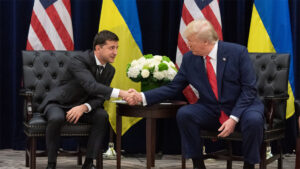We’re about halfway through the NAFTA (North American Free Trade Agreement) talks and things…have taken a turn for the worse.
Let me back up a bit. Wherever you land on the issue of trade and U.S. engagement with the broader world, there are a few key truths:
For the United States, trade has only rarely been about trade. It has instead been about security. The Americans created the global trade order at the end of WWII to bribe up an alliance to fight the Cold War. The Americans subsidized their allies, granting access to the U.S. market and safe sea lanes, and in exchange those allies gave the Americans security deference to battle the Soviets the American way.
The Cold War is long gone, but the Americans never adjusted their strategy, resulting in a steady bleed of political support for a security policy that is now three decades out of date. One result, among many, is a broadscale shift on the American Left (Bernie Sanders and Elizabeth Warren) and Right (Donald Trump and Ted Cruz) towards populism, broadly discrediting the very concept of free trade. It’s understandable: why continue subsidizing the allies if the war is long since over?
So that’s the big picture. Let’s look at some of the specifics:
Most of the United States’ Eastern Hemispheric trade is wrapped up in rules run by the (U.S.-designed) World Trade Organization, which among other things provides the legal and structural baselines for trade with the European Union and China. Other pieces of the global trade portfolio are based on bilateral deals with key allies – think South Korea, Australia, Morocco, Jordan, Israel, Singapore. For the most part, economic rationale was not the driving force in any of this. The deals designed to cement strategic alliances, either as incentives to cooperate (the WTO) or as a reward for consistently loyal behavior (Australia).
With the Americans changing their internal weightings on the trade-vs-security question, all such deals are subject to re-evaluation. Since none of these deals were made with economic linkages in mind, the U.S. government never prioritized making such linkages. In percentage terms, the United States remains one of the least internationally-wired economies in the world, so the economic consequences to the United States for walking away from those deals are somewhat limited.
NAFTA has understandably gotten caught up in the anti-trade tirades, but NAFTA is notlike America’s other trade deals. It was never part of the global trade-for-security trade-off. Its primary purpose was to deepen and broaden American economic penetration throughout the North American continent. Nearly unique among America’s trade deals, NAFTA wasn’t about security. It was actually about trade. Today, roughly 30% of America’s entire trade portfolio is within NAFTA.
The result has been a complex entanglement of the economic and political fortunes of the three signatories. Manufacturing supply chains now crisscross the two international borders at multiple points in multiple industries with the deepest integration occurring in automotive, aerospace, electronics and agriculture. Regardless of what you think of the balance of such integration or how well/badly NAFTA was negotiated by the George (no W) Bush administration, an outright severing of such links would have horrific results.
- The United States and Canada would suffer a deep recession. Texas, the state most dependent upon trade with Mexico, would be worst hit.
- Mexico would suffer a flat-out depression. The United States is the end-destination for four-fifths of its exports.
- Economic calamity would uproot millions of Mexicans from their jobs. One of the great NAFTA success stories is the creation of a Mexican middle class where there didn’t used to be one. Throwing these people back into destitution would trigger the greatest migration surge in Mexican history, and there is really only one place for them to go: north.
- Ending NAFTA would enflame the North American drug war. Part of the reason why the Mexican cartels have expanded so slowly (feel free to read that again) is that NAFTA has bolstered the living standards of tens of millions of Mexicans. Deny those Mexicans the ability to earn a living by trading with the United States and Canada and the cartels will find their recruitment and bribing operations far easier. And not just on the south side of the border…
It isn’t that a NAFTA renegotiation doesn’t makes sense, it does; NAFTA is a quarter-century old. When it was implemented the Internet didn’t even exist. An update is perfectly logical. Necessary even. And since the United States is far better at all things tech-related than either Canada or Mexico, a meaningful update would certainly address things like the trade imbalance that so impassions so many of NAFTA’s US-based detractors.
But simply uprooting NAFTA would be a catastrophic mistake for the American economy. Add in Texas’ reputation as an anything-but-liberal state with 38 electoral votes, and I’ve always assumed that in time cooler heads would prevail and that NAFTA was never in any real danger.
But four things changed recently that have made me far more sanguine.
First, in Mexico the drug war is turning hot at exactly the wrong time. Violence is rising in areas very visible to the Americans, most notably tourist areas such as Cabo and Puerto Vallarta, and the border towns of Tijuana and Juarez. I expect the violence to surge in a few months in what is a quintessential example of bad timing: just as the NAFTA renegotiations are pegged to be completed, just as the new NAFTA documents will be presented to Congress for ratification, and just as the United States’ off-year Congressional elections campaigns kick off.
Populists of all stripes will be railing against free trade in general and Mexico in specific, just as record levels of gratuitous gunfire exchanges, beheadings and kidnappings just across the border populate local newscasts in San Diego, El Paso and Laredo. It will seem very attractive to many Americans to simply walk away from NAFTA altogether.
Second, Trump’s general anti-Mexican mood has put most Mexicans into a general anti-American mood. The United States is hardly the only country with inconvenient elections in 2018; Mexico’s presidential campaign is already heating up, and the full vote occurs next July. While calling an election this far out is silly, a bugaboo from Mexico’s past – one Andrés Manuel López Obrador – is polling disturbingly strongly. López Obrador is in essence the Mexican equivalent of a Trump-Sanders mashup when it comes to trade policy and bilateral relations. A López Obrador election wouldn’t simply crash NAFTA on the Mexican side of the border, López Obrador combined with Trump would sour every piece of the American-Mexican relationship. Everything from cooperation on the drug war to water rights would turn from today’s cold cooperation to pathological hostility.
Third, never forget that while Mexico and Canada are both eager to work with the United States, they view each other as the primary competitors for access to American markets and investment. That competition may well be getting more cut-throat than usual.
There are a pair of issues the Canadians have highlighted as make-or-break: tribunals and government contracting.
NAFTA’s tribunal clause manages disputes within the treaty’s competencies. Should a firm in one country feel it is being treated unfairly, it calls for a bilateral panel to adjudicate the dispute rather than suing in the court of the offending party. This keeps disputes out of often-slow and clogged courts, prevents countries from enacting protectionist measures that can fall back under the protection of their home legal system, and in general speeds and ensures the fairness of the dispute resolution. The government contracting clause is similarly straightforward: it codifies that governments cannot discriminate against non-national companies for contracts.
The Trump administration has very strong opinions on both topics: it wants the tribunals to go and it wants to be able to preference domestic companies for domestic government work (The White House calls the latter the “Buy American” provision.)
The Canadians have diametrically opposite positions. For them, the tribunal issue is a red line – both now and during the initial negotiations. They know that should disputes with the United States be remanded to U.S. courts, they’d either not have a chance or couldn’t stand the years-long appellate process. (Brian Mulroney, the Canadian prime minister during the original NAFTA negotiations, nearly closed off talks altogether over the tribunal issue.) And of course the Canadians would like for their firms to be able to keep taking cracks at servicing the U.S. government.
Which is why Canadian Foreign Minister Cristina Freeland has been playing hardball on both issues, to the point that by most reports the Mexicans are simply standing to the side while the Anglos slug it out. And by some reports it is the Canadians – not the Americans – who have stalled the talks altogether.
Which makes a sort of backwards sort of sense. While NAFTA is the issue for Mexico’s modern political and economic survival, for Canada the issue isn’t so clear. Equal access for both Canadian and Mexican manufactures to the U.S. market has cratered Canadian competitiveness; Mexican manufacturers have moved up the value-added chain quickly this past decade, while Canadian manufacturing – particularly in the Toronto region – has more or less stalled. Add in Mexico’s cheaper wage structure, and NAFTA is far more of a wash economically for the Canadians than it is for the Americans.
Yet, Canada has a separate free trade deal with the United States that pre-dates NAFTA. If NAFTA were to fail, Canada doesn’t simply have a fall-back, a tanked NAFTA would boost Canada in American markets at Mexico’s expense.
Cold. Brutal. Arguably very unCanadian. But damnably effective.
Fourth, back in Washington, NAFTA has lost its loudest cheerleader. There were never a lot of free-traders on the Trump Team, most of what few there were have already left the administration. The most prominent of the Remainers is Commerce Secretary Wilbur Ross.
The Commerce Department tends to view NAFTA from a data point of view, not a nationalistic one. A few weeks ago, Ross warned that NAFTA has not really deepened economic linkages among the NAFTA signatories, but instead has encouraged countries beyond North America to ship parts to Mexico and Canada, get a few tweaks made so that they qualify for the Made-in-NAFTA stamp, and then get shipped on to the United States. He argues that in all actuality, NAFTA has squeezed out American-made components not in favor of Mexican or Canadian components, but instead Chinese and German components. (His op-ed is here.)
If there is any truth to Ross’s concerns, then forget gut-nationalism and rabid-populism, the economic case for NAFTA suddenly looks a lot weaker. And even if all the data Ross cited is cherrypicked and/or questionable – and my left eyebrow is fully arched – anything other than full-throated praise from the Commerce Department lands NAFTA with a pretty damning problem.
Ross’s solution is to sharply update NAFTA’s rules-of-origin criteria, and hardwire a 5-year sunset provision into the agreement, forcing all three players to revisit and update NAFTA about once a president. It would be laborious, contentious and make NAFTA a political issue in all three countries All. The. Freaking. Time.
But if the emerging American position on trade is to ensure it doesn’t undermine local economies, and if the future of trade is that it can only occur with strong public support, that may well be the only way forward.










